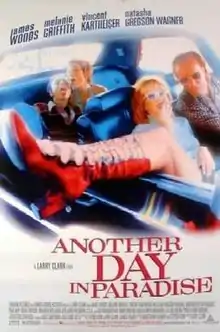Another Day in Paradise (film)
Another Day in Paradise is a 1998 American crime drama film directed by Larry Clark and starring James Woods, Melanie Griffith, Vincent Kartheiser and Natasha Gregson Wagner. It was released by Trimark Pictures. It is based on the novel Another Day in Paradise written by Eddie Little. The movie won the Grand Prix award at the 1999 Festival du Film Policier de Cognac.
| Another Day in Paradise | |
|---|---|
 Theatrical release poster | |
| Directed by | Larry Clark |
| Produced by | Larry Clark James Woods Stephen Chin Scott Shiffman |
| Written by | Stephen Chin Christopher B. Landon |
| Based on | Another Day in Paradise by Eddie Little |
| Starring |
|
| Cinematography | Eric Alan Edwards |
| Edited by | Luis Colina |
| Distributed by | Trimark Pictures |
Release date | December 30, 1998 |
Running time | 105 minutes (Director's cut) 101 minutes (Theatrical) |
| Country | United States |
| Language | English |
| Budget | $4,500,000[1] |
| Box office | $1,036,818[2] |
It originally had the rare NC-17 rating.[3] The American theatrical release was cut for the purpose of obtaining an R rating, reducing the film's running time from 105 to 101 minutes. Clark's original cut ran over 140 minutes.
Previously both Woods and Griffith had worked together in the 1975 film Night Moves and the 1990 TV film Women and Men: Stories of Seduction.
Plot
A vending machine robbery by small-time thief and drug addict Bobbie goes badly awry, and his friends contact street-wise thief and part-time druggie Mel to patch him up.
Recognizing a kindred spirit, Mel befriends Bobbie and his girlfriend Rosie, inviting them to join him and his long-suffering girlfriend Sid on a drug robbery which should set them up for life. The seemingly simple robbery is a great success, but the sale of the drugs afterward fails badly, and Mel and Bobbie are shot.
The four take refuge with the Reverend, who charges them half of their haul from the robbery to care for them. In a desperate attempt to recover their losses, Mel involves the crew in a disastrous, ill-advised jewelry robbery. Bobbie and Rosie have an argument before Bobbie leaves. After the robbery fails, he returns to find Rosie has committed suicide via heroin.
Bobbie explodes at Mel and blames him for everything. When they stop somewhere for Bobbie to use the bathroom Mel tells Sid about his plans to kill Bobbie. When asked to buy a shovel she informs Bobbie of Mel’s plan and gives him some money. He runs away, through a cornfield as Mel and Sid drive off, finally free.
Cast
- James Woods as Mel
- Melanie Griffith as Sid
- Vincent Kartheiser as Bobbie
- Natasha Gregson Wagner as Rosie
- James Otis as Reverend
- Branden Williams as Danny
- Brent Briscoe as Clem
- Peter Sarsgaard as Ty
- Lou Diamond Phillips as Jewels
- Paul Hipp as Richard Johnson
Production
Principal photography began in November 1997 and wrapped in January 1998. The making of the movie was edgy and fraught with potential disaster, according to those involved with the film. "Given the outrageous circumstances, it’s amazing that the movie happened at all," said the film’s co-producer and co-writer Stephen Chin.[3] The film’s star and co-producer James Woods described the shoot as a “nightmare” and the director Larry Clark as a "rude pig."[3] The night of the film’s world premiere in Venice, Clark physically attacked Chin.[3]
A major bone of contention for Woods was Clark’s friendship with the film’s other star, Vincent Kartheiser, which Woods said reflected the mentor-protege friendship between Woods’ and Kartheiser’s characters in the film, though Kartheiser’s manager Mike Cutler said there was no such bond.[3]
When Clark’s cut of the film was shown to potential distributors, it was 40 minutes longer, and would have brought an NC-17 rating because of a graphic sex scene between Kartheiser and Natasha Gregson.[3] Clark and Kartheiser had wanted to shoot an even kinkier version of one of the sex scenes, but Gregson refused to do it.[4] "I knew if Larry really believed in the idea, he wouldn't have come with Vincent and he wouldn't have waited until the day of to discuss it with me," said the actress.[4] The producers eventually wrested the film away from Clark and re-cut it in California.
The re-edited version was accepted by the Venice and Toronto festivals and received strong reviews. Trimark Pictures stepped forward and made an offer for the film. Though Clark agreed to the changes, he began maligning Woods in interviews, further alienating the actor. "We killed ourselves to allow him to make the film his way and he’s saying I ruined his picture," Woods said. "He was passed out drunk in the editing room and, as the producer, I could have had him thrown out. But I promised I wouldn’t interfere. He got his final cut."[3]
Music
The film's soundtrack includes mainly 60s and 70s soul music, including songs by Otis Redding, Clarence Carter, Allen Toussaint, and songs by other artists such as The Tornadoes and Bob Dylan.
Reception
Another Day in Paradise received mixed reviews from critics. On Rotten Tomatoes it has an approval rating of 58% based on 50 reviews.[5] It was the last film that film critics Roger Ebert and Gene Siskel gave their famous ’two thumbs up’ to.
References
- https://www.imdb.com/title/tt0127722/business
- https://boxofficemojo.com/movies/?id=anotherdayinparadise.htm
- Natale, Richard (28 December 1998). "Trouble in Making of 'Paradise'". latimes.com. Los Angeles Times.
- Rochlin, Margy (15 November 1998). "Holiday Movies". nytimes.com. The New York Times.
- "Another Day In Paradise (1997)". Rotten Tomatoes. Retrieved November 27, 2020.